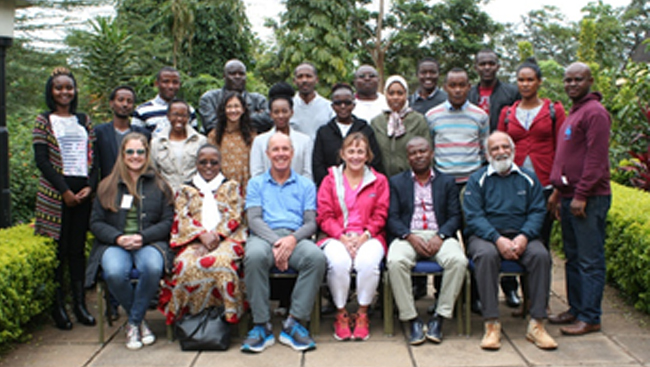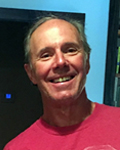
Each year, the International Brain Research Organization (IBRO) partners with the Society of Neuroscientists of Africa (SONA) to host summer neuroscience schools in Africa for graduate students and junior faculty from across the continent. Instructors from Africa and elsewhere collaborate to lead lectures, labs, and one-on-one student coaching.
Peter Kalivas, neuroscience professor and chair at the Medical University of South Carolina (MUSC), has been an instructor twice and plans to continue in the years to come. Here, he shares his experience from July 2018 in Nairobi, Kenya and his hopes for the global scientific community.
Can you give a snapshot of the goal and structure of the summer school?
The broad goal of the IBRO-Africa summer schools is to promote neuroscience research and education in Africa. This year’s school in Nairobi, Kenya centered around addiction. Attendees were PhD students from across Sub-Saharan Africa, including Cameroon, Ethiopia, Kenya, Nigeria, South Africa, Tanzania, and Uganda, and faculty were from Kenya, Tanzania, South Africa, and the United States.
Faculty from Africa and North America partnered to lead the course, breaking up lectures by topic area. So, someone from North America gave a talk about addiction through the lens of epidemiology. Then, a faculty member from Africa gave a talk focused on addiction issues specific for Africa. From there, all the instructors go into the neurobiology of addiction.
We start off general because the students have varying backgrounds and training levels. For example, everybody knows what a synapse is, but not everyone will understand the principles of synaptic plasticity.
We gradually ramp up. By the end of day two, we're discussing cutting-edge science, such as learning about the latest findings in how drugs change brain circuits to produce craving and relapse. The students also brought data they were working on. They were assigned a faculty member to work with throughout the course. Part of the goal was to help them organize their data in a scholarly and controlled way so they can be published in reputable Western journals.
On the last day, we focused on clinical trials. There was one lecturer from Tanzania who has an NIH grant with faculty at MUSC to set up addiction treatment clinics in Tanzania. He shared how that connection got started, how it works in Tanzania, and what they've learned throughout the process. We are hopeful that some of the students will be recapitulating a similar program in their country, sculpted by what would work best for their specific communities.
What did you learn about the importance of global collaborations through this experience?
It is true for all scientists that the international scientific community is a richer and more productive environment for discovery than if you confine yourself to your university, state, country, or culture. This IBRO-Africa school is one example of the process for creating that scientific community.
Africa is heterogeneous scientifically. The far north and far south are relatively advanced, whereas parts of Sub-Saharan Africa are a largely untapped human resource for advancing research and education in neuroscience, with great potential to be further developed.
Schools like the IBRO-Africa school are one way to help bring more African scientists up to a level of scientific discovery that can compete with the international community. These students are interactive, fearless, and smart. They have the skills to build relationships and develop their scientific communities at home. Faculty from all over the world describe how science works in their countries, which models what students can achieve and aspire to.
Why do you stay involved year after year?
As scientists working at the basic science level, we often don’t see progress that directly benefits others. Opportunities like this school are a way to give back to humanity and the field directly.
Additionally, working with these students reminded me of when I was a graduate student — when I had an untainted passion for scientific exploration, before the grant and publication infrastructure came to strongly influence my thinking. Students across the world have a passion for research, and students in Africa are grateful for the experience and everything they learn in the course. It is an honor to play a small role in helping them actualize their scientific goals.
Another aspect is the scientific cultural exposure. It feels wonderful when you connect with somebody and can share with each other what the scientific world is like in your home countries. This is a small step toward building bridges to a world of greater international collaboration.
I'm excited about the summer school taking place in Morocco next year. We’re trying to transfer newer technologies that can be done in a relatively low-tech environment to help students get their research published in competitive journals.
I’d encourage others to jump at opportunities to get involved in the global scientific community. Make personal contacts and look for opportunities, such as partnering on a grant or doing a short or extended overseas lectureship.
What impact are you hoping to see from these summer schools?
I hope this process sets up relationships between African and North American faculty, and between students who attend. I hope these students get grants to visit laboratories in North America, China, Europe, or elsewhere where they can spend a few years conducting cutting edge neuroscience research.
Ultimately, these schools bring the global scientific community closer together, which is all part of the evolution of a scientific society.
Speaker



.png?h=1763&w=3125&la=en&hash=B2439C2768576BED6405672E5CD5CF8CB1AA375F)




